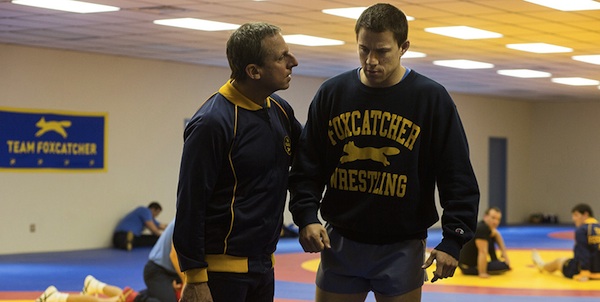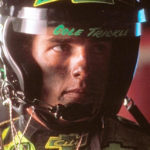Foxcatcher Review
In the winter of 1996, John du Pont—a wealthy ornithologist, philatelist, and philanthropist—shot and killed Olympic wrestling champion Dave Schultz. Most familiar with the case and the two men found the affair entirely uncharacteristic of du Pont. Schultz and du Pont were friendly. The latter employed the former as an assistant coach on his Foxcatcher Farms, where amateur wrestlers trained for elite international competitions (including the Olympics). It was a seemingly inexplicable crime, but director Bennett Miller seeks to explain it in his latest film, Foxcatcher, though not necessarily in the most direct fashion.
Foxcatcher really is the story of Mark Schultz (Channing Tatum), younger brother of Dave (Mark Ruffalo) and “protege” of du Pont (Steve Carell). It’s a story about men chasing fulfillment in all the wrong places, and it’s told frostily, almost frighteningly by Miller in his third effort behind the camera. It takes some effort on the part of the viewer to appreciate it or, if you’re so inclined, reach out and grab it. But for those (few, probably) who are ready to pick up what Miller throws down, you’re in for a darkly humorous, complex piece of dramatic Americana.
We first meet the Schultz brothers in the wake of their 1984 Olympic triumphs. Dave is married with kids and happily employed as a college wrestling coach. Mark isn’t ready to give up competing, and he’s single-mindedly focused on 1988’s Seoul games. Out of the blue, however, he’s summoned by du Pont. “Come meet me at my Foxcatcher farms,” he requests. Nothing more, nothing less.
Upon meeting, du Pont basically offers Schultz whatever he wants to train at Foxcatcher and wrestle for “Team Foxcatcher” in future competitions. Basically an orphan who was raised by his brother, he sees du Pont as a father figure who will care for him above all others—and the money isn’t bad either. Dave isn’t interested, though, and du Pont isn’t the wrestling mind or sparring partner—nevermind the emotional support system‐Mark’s brother is.
What ensues is a tried and true fall from grace, but knowing how the story plays out adds a level of uneasiness to the story. So too does Miller’s filmmaking style. He lingers on every scene about 20-30 seconds longer than you’d expect (or in some cases, longer than you’d want). Mark and Dave wrestle in extreme close-up for several minutes. du Pont drinks, drinks, and drinks himself silly while celebrating one of his team’s accomplishments. And on route to a social event, du Pont repeats over and over and over the three titles he wishes Mark use to introduce him—”Ornithologist, philatelist, philanthropist. Ornithologist, philatelist, philanthropist. Ornithologist, philatelist, philanthropist. Ornithologist, philatelist, philanthropist.” A lot of it is truly absurd, and will make you laugh, even if you do so uncomfortably. But more than anything, Foxcatcher will make you squirm in your seat, with regularity, for nearly two and a half hours. It’s a different style than the one he employed to such great effect in Capote and particularly in Moneyball, and while he doesn’t exactly knock the ball out of the park—even the film’s warmer elements are distressingly detached—he’s still comfortably on base.
The film is nothing, however, without the three exceptional performances at its core. First is Steve Carell. Behind the goofy nose and affected physical and vocal mannerisms is a deeply human portrayal of a man whose humanity is in question from the outset. Again, most people (including those who read this review before seeing the film) will more or less know how this film ends before it begins, so it’s remarkable that Carell (with a big assist from Miller and the film’s screenwriters, Dan Futterman and E. Max Frye) can imbue his character with so much empathy. He just wants to live up to his family’s legacy and make his mother proud. The journey to get there, however, drives him mad.
Channing Tatum, like Carell, is a revelation. His is an intensely physical performance—he wears his emotions in his shoulders, his arms, his scowl. But he’s a man of few words, and you see the characters around him struggling to figure him out most of the time—even his brother. And as Dave, Ruffalo plays it straight, but it’s not the same character he’s become known for over the years. His Dave is caring and very focused, determined. He’s also plain-spoken and pragmatic. Miller doesn’t ask Ruffalo to do too much, and as such, there’s a risk of him getting lost in the shuffle, but Ruffalo instead does something important—he keeps the film grounded.
Foxcatcher strikes me as the kind of film that really clicks into place on a second viewing. Perhaps that’s because both Capote and Moneyball did, at least for me, or maybe it’s because I was so taken aback by its severity. Even still, though, there’s a lot to love here—clever cinematography, resonant themes, and great cinematography.
















